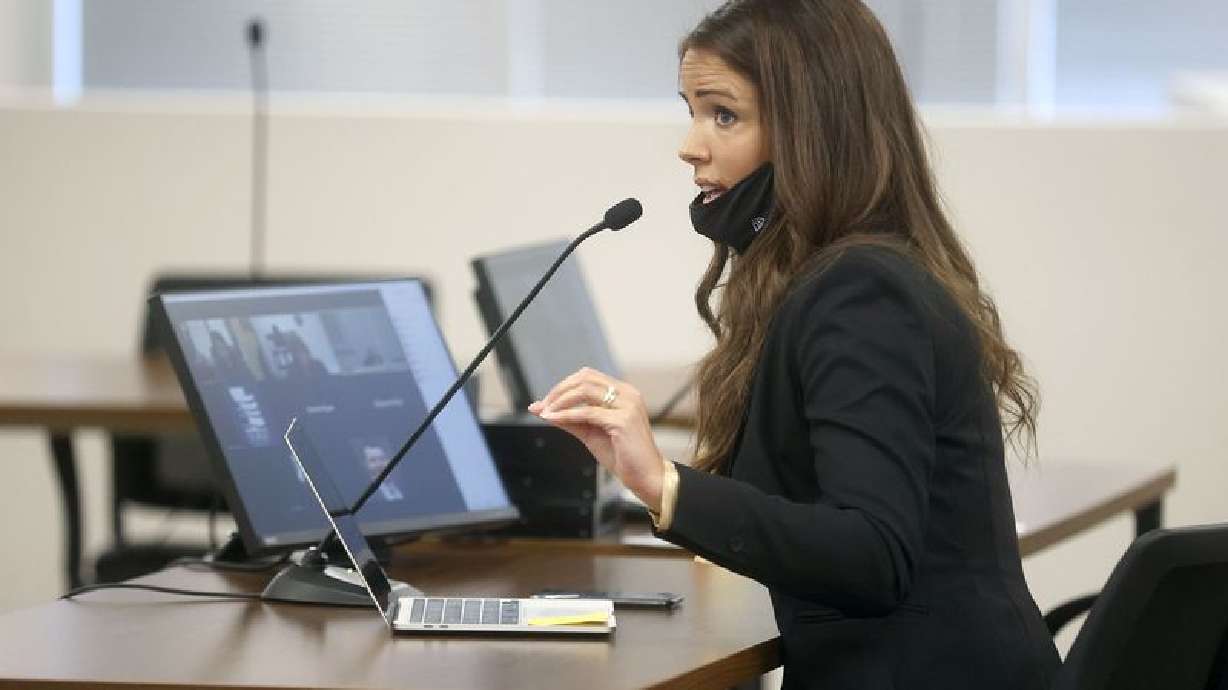Estimated read time: 4-5 minutes
This archived news story is available only for your personal, non-commercial use. Information in the story may be outdated or superseded by additional information. Reading or replaying the story in its archived form does not constitute a republication of the story.
SALT LAKE CITY — The debate about whether transgender girls should be able to play on girls sports teams returned to the Utah Legislature on Wednesday as a new bill was introduced that's said to be more palatable to LGBTQ advocates.
Rep. Kera Birkeland, R-Morgan, said she met throughout the interim with Lt. Gov. Deidre Henderson, Attorney General Sean Reyes' office, the education community, coaches, the ACLU, Equality Utah and on and off with parents and community members.
The work came after the 2021 General Session this spring, when Birkeland introduced a bill that would ban transgender girls from competing in Utah high school sports. The bill stalled in the Senate after Gov. Spencer Cox indicated he would not sign it as written should it pass, and the tech community spoke against it decrying potential economic impacts as athletic events could ultimately avoid Utah.
The new bill "will serve the needs of the youth participating in our high school athletic programs," Birkeland said during a Health and Human Services Interim Committee meeting.
She said she reintroduced the legislation because she wants to preserve equal opportunities for all students.
New proposal
Under the bill, transgender students would need to change their birth certificates to match their gender identity, which she says transgender advocates with the ACLU and Equality Utah proposed.
The bill would also codify the athletic association's policy to require that a female-to-male athlete who is taking gender-affirming hormone treatment is only eligible to play on a boys team. Under the rules, a male-to-female transgender athlete who is not taking hormone treatment is only able to play on the boys team.
The bill would outline that a female-to-male athlete who is taking testosterone would not be able to play on a female team. During the session, the previous bill faced criticism that it did not address transgender boys.
Under the rules, a male-to-female transgender athlete who is taking gender transition hormones is able to play on the boys team at any time, but is only able to play on the girls team after a year of hormone treatment, Birkeland said.
That current policy of the Utah High School Activities Association is mirrored after the NCAA policy. Birkeland called it a "fair, balanced policy" that should be put into state code.
Parents want to know their children are treated with fairness "because they went through the appropriate process to get there, just as all students do," Birkeland explained.
The rules would only pertain to high school, and schools would be encouraged to let middle school students know they need to complete the requirements before starting high school athletics and competition.
Rep. Merrill Nelson, R-Grantsville, questioned whether the bill would require hormone testing for transgender students and how the bill would ensure there is a "fair playing field."
The bill would not require any testing, Birkeland said, adding that some stakeholders have proposed creating another bill that would put in place a voluntary study on that issue.
"There is not a lot of scientific data that's helping us guide how to do this, what's best," Birkeland said, emphasizing that she did not want the state to require testing when there isn't data to show it's needed.
Changes requested
Clifford Rosky, professor of constitutional law at the University of Utah speaking on behalf of Equality Utah, thanked Birkeland for engaging with the group. He said "great" progress has been made on the issue, but the current draft has "relatively small" problems.
The requirement to change one's sex on a birth certificate, although it was proposed by Equality Utah, is now redundant, Rosky said, due to the hormone treatment requirement. The requirement would also incur an additional cost on students, who would need to pay court fees and hire a lawyer to go through the process.
He also said the one-year hormone treatment rule might also be longer than needed. While the NCAA requires one year for adults, he said there's "very good reason" to believe younger people can transition faster after taking puberty blockers. He recommended changing the time frame to six months on hormone therapy.
It would be a "real landmark moment for our state if all sides could come together" on the issue, Rosky said.
Sue Robbins, also with Equality Utah, said she appreciated the process the bill went through during the interim.
She asked that the Legislature reject other bills that would conflict with it, including a potential bill that ran during 2021 that would bar doctors from providing gender-affirming treatment and one that would prohibit changes of gender markers on birth certificates.
Elizabeth Converse, with Silicone Slope Commons, praised Birkeland for working to get to a "middle ground" on the bill but said the tech community still opposes it and policies of its kind that "put barriers" to activities.
"There's a true financial impact on our state," she said.
Sen. Jake Anderegg, R-Lehi, asked Converse to help the tech CEOs better understand the legislative process and engage in it "so that they're not knee-jerk reacting ... based upon what the media has said."
The bill received a favorable recommendation from the committee, meaning it will be considered during the 2022 general session, with some lawmakers noting it will likely need additional work.










